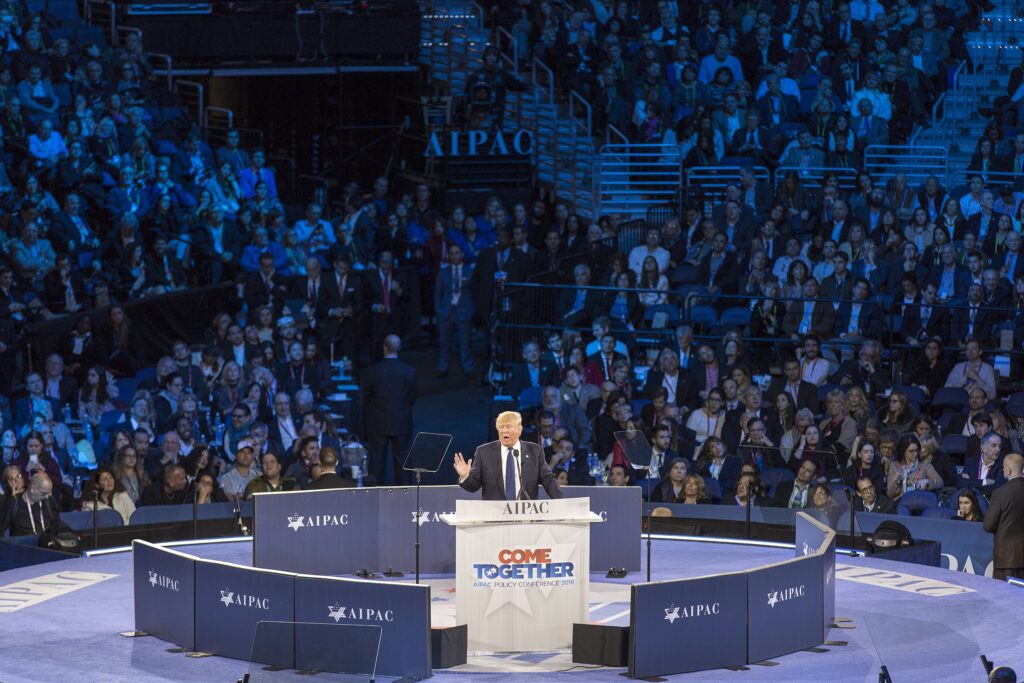(LOS ANGELES) — The American Israel Public Affairs Committee [AIPAC] is potentially the most influential pro-Israel lobbying group in the United States. They have been actively advocating for U.S. policies favorable to Israel since 1951.
One of the key issues that AIPAC has been lobbying for in recent years has been countering “Iran’s aggression.” AIPAC believes Iran “remains Israel’s and America’s greatest threat in the Middle East.” These lobbying efforts have focused on preventing Iran from getting nuclear weapons amid a broader push to isolate and oppose Iran in the region.
But critics of AIPAC’s lobbying efforts argue that it has an outsized influence on U.S. politics and foreign policy and that its policies towards Iran are overly hawkish and could lead to further conflict in the Middle East.
Peter Beinart, editor-at-large at Jewish Currents and a non-resident fellow at the Foundation for Middle East Peace, pointed to the influence of their lobbyists that gets at the heart of the problem with money in politics.
“AIPAC has a lot of very influential activists across the country who not only raise money but use their fundraising ability to develop relationships with members of Congress and then prove quite influential with those members of Congress.”
However, Beinart was critical of AIPAC when it acts against the interests of the public voters, especially that of Democratic voters.
“It’s in the Democratic Party where AIPAC’s more influential in maintaining the support of Democratic politicians, even in the face of the public opinion of actual Democratic voters,” he said.
Mitchell Plitnick, the president of ReThinking Foreign Policy and a frequent writer on the Middle East and U.S. foreign policy, furthered the critique. He argued that AIPAC is pushing the Israeli right’s agenda, unlike other lobbying groups like the NRA that push an American agenda.
“Their question is, what does the Israeli government want? And that is an improper basis for U.S. foreign policy. U.S. foreign policy should be based on what U.S. citizens want and what the United States’ strategic interests may be. These are not reflected in U.S. policy. So that is where AIPAC is problematic,” Plitnick added.
AIPAC did not respond to The Click’s requests for comment.
Recent news of long-time regional rivals Saudi Arabia and Iran agreeing to resume diplomatic relations sent shockwaves in the Middle East and will surely have dealt a blow to AIPAC’s lobbying efforts to isolate Iran in the region, especially considering Saudi Arabia is a strong ally of the United States.
To understand the amount of money that AIPAC has spent lobbying against Iran, it is essential first to examine the context of U.S.-Iran relations. The U.S. and Iran have had a tumultuous relationship over the past few decades, with the two countries being on opposite sides of many geopolitical issues in the Middle East.
In 2015, the U.S. and other world powers signed a historic agreement with Iran, known as the Joint Comprehensive Plan of Action (JCPOA), which aimed to curb Iran’s nuclear program in exchange for lifting economic sanctions.
AIPAC spent a then-record $3.3 million on lobbying efforts in Washington, according to lobbying disclosures. They directed much of that money toward opposing the JCPOA. This included lobbying on House and Senate “Resolutions of Disapproval on Iran Nuclear Agreement.”
Although AIPAC lobbied against it, Congress ultimately approved and implemented the JCPOA in 2016. However, in 2018, the Trump administration withdrew from the agreement and reimposed economic sanctions on Iran, which pleased AIPAC.
Since then, AIPAC has been actively lobbying for policies that would maintain pressure on Iran, including increased sanctions and other measures to prevent Iran from obtaining nuclear weapons.
For example, the latest available lobbying disclosures show that AIPAC spent over $740,000 on lobbying efforts in Washington in Q4 of 2022. These disclosures reveal that a third of the bills that they lobbied had to do with Iran. These included bills to solidify sanctions on Iran as well as those that condemned the Iranian government concerning their crackdown on protestors.
However, a part of AIPAC’s lobbying that might go under the radar has been their successful efforts in getting certain provisions in the annual National Defense Authorisation Acts (NDAA) that increase pressure on Iran.
Such provisions include those concerning sanctions on Iran as well as requiring the U.S. government to develop a strategy to counter Iranian influence in the Middle East. AIPAC commended the passage of the most recent NDAA, citing important provisions that would help “defend against Iranian threats”.
In light of the recent peace agreement between Iran and Saudi Arabia, a part of AIPAC’s lobbying efforts worth considering is its support for the Abraham Accords.
They were a set of agreements signed in September 2020 between Israel, the United Arab Emirates (UAE), and Bahrain, with the mediation of the United States. The agreements normalized diplomatic, economic, and cultural relations between the signatory countries and marked a historic shift in the Middle East’s geopolitical landscape.
In 2020, the year the Abraham Accords were signed, AIPAC spent over $2.2 million on its lobbying efforts, according to lobbying disclosures, with much of it spent lobbying lawmakers to support the accords.
Since Saudi Arabia and Iran signed a similar deal, AIPAC’s lobbying efforts against Iran may be affected. The deal could potentially reduce tensions between Saudi Arabia and Iran, which have been critical drivers of regional instability and conflict.
Given that Saudi Arabia remains a strong ally of the U.S., a shift in U.S. foreign policy towards Iran and a decrease in the perceived threat from Iran could potentially occur. As a result, this could influence AIPAC’s efforts to advocate for stringent measures against Iran.


